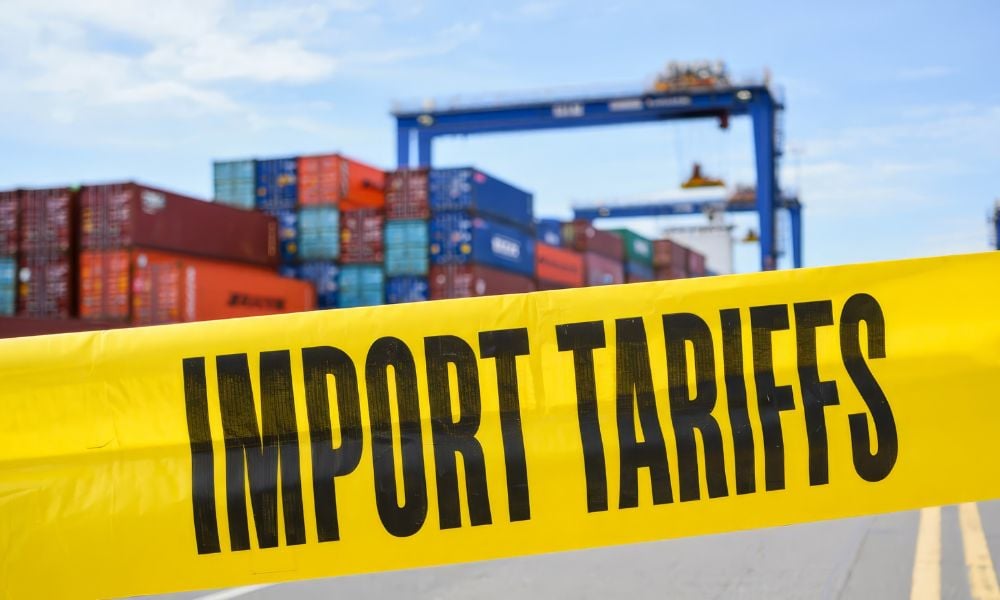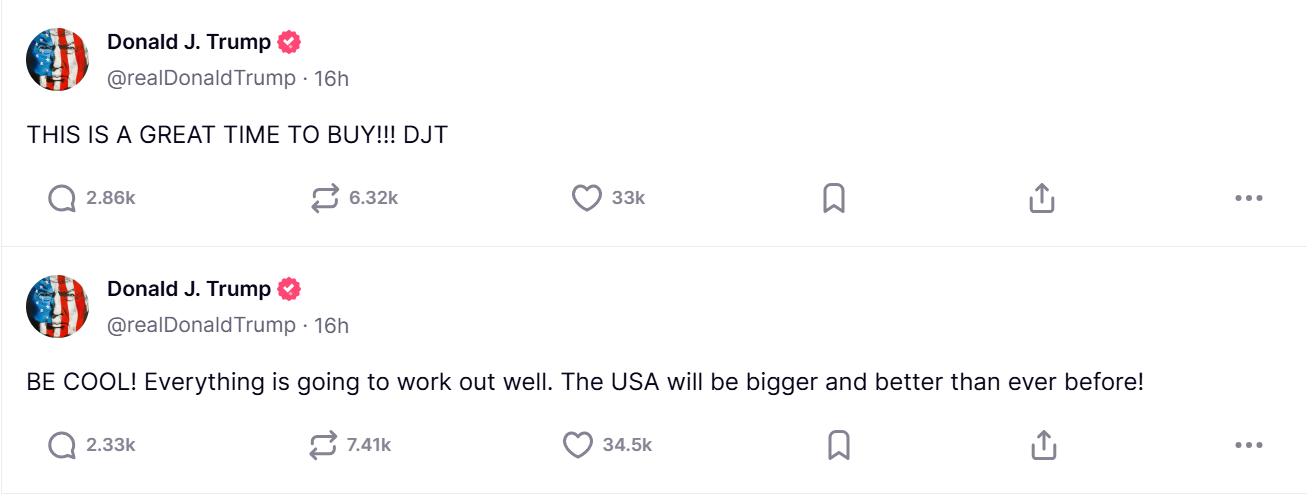Markets rally then dip as Trump pauses most global tariffs but targets China and pharma with hikes

On Wednesday, US President Donald Trump announced a 90-day pause on most reciprocal tariffs while simultaneously increasing tariffs on Chinese goods to 125 percent, effective immediately, according to BNN Bloomberg.
Trump stated on social media that he “authorized a 90 day PAUSE, and a substantially lowered Reciprocal Tariff during this period, of 10%, also effective immediately.”
The decision came hours after Trump urged the public to “BE COOL” and said “THIS IS A GREAT TIME TO BUY!!!” When pressed about when he decided on the pause, Trump gave a muddled timeline: “This morning. Over the last few days, I’ve been thinking about it. Fairly early this morning.”

Source: Donald J. Trump @realDonaldTrump via TruthSocial
Canada is exempt from the 10 percent baseline tariff, according to a White House email to CTV News.
However, other levies remain in place, including 25 percent tariffs on non-CUSMA-compliant Canadian goods and 10 percent tariffs on Canadian energy.
Minister of International Trade Dominic LeBlanc contacted US Commerce Secretary Howard Lutnick seeking clarity on the announcement.
Canadian vehicles remain exempt until the US administration “establish(es) a process” to tax non-American vehicle components of CUSMA-compliant products.
Unifor, which represents nearly 22,000 Canadian auto workers, backed Canada’s retaliatory tariffs, stating that the country “did not start this trade war, but we have no choice but to fight.”
Markets initially surged in response. The S&P 500 soared 9.5 percent, the Nasdaq climbed 12.2 percent, and the Dow Jones gained nearly 3,000 points.
The S&P/TSX composite index rose more than 5 percent, a gain of over 1,200 points. Shopify Inc., Brookfield Corp., and Royal Bank of Canada led Canadian gains.
By late afternoon, volatility returned. The TSX dropped 41.29 points to 22,465.61. In early trading, it had fallen more than 100 points.
Futures also pointed to further US losses, with China’s retaliation looming.
China raised its tariffs on US imports to 84 percent, up from 34 percent.
The Ministry of Commerce said, “If the US insists on further escalating its economic and trade restrictions, China has the firm will and abundant means to take necessary countermeasures and fight to the end.”
A white paper stated that the US had failed to honour its phase 1 trade deal.
At the World Trade Organization, a Chinese envoy claimed the US had “set the very architecture of the multilateral trading system ablaze.”
China also issued a travel advisory, citing safety concerns for citizens visiting the US.
The European Union approved US$23bn in retaliatory tariffs, to take effect in phases.
The European Commission stated, “The EU considers US tariffs unjustified and damaging.”
French government spokesperson Sophie Primas called for a pause in investments in the US and said Europe’s response will be “united, proportionate and determined.”
Spain’s Prime Minister Pedro Sánchez, while visiting Vietnam, also warned, “A trade war favors no one. We all will lose.”
Mark Carney welcomed the tariff pause as a “reprieve for the global economy,” and confirmed upcoming US–Canada negotiations on a new economic and security relationship post-election.
US Treasury Secretary Scott Bessent claimed the 10 percent tariffs will stay in place due to “a processing problem” and said the US was “overwhelmed with responses from allies” seeking to negotiate.
He emphasized that Trump wants to be personally involved in bespoke agreements. US Press Secretary Karoline Leavitt said Trump was demonstrating “the Art of the Deal.”
US businesses also reacted. Delta Air Lines rescinded its 2025 financial forecast, citing trade uncertainty.
Walmart dropped its first-quarter guidance, and JPMorgan Chase CEO Jamie Dimon warned of a possible recession and credit defaults.
Dimon said, “I hope what they really do is... get those things done quickly,” referring to trade talks.
Tech stocks rebounded briefly, with Apple and Nvidia gaining 3.3 percent and 2 percent, respectively. But Asian and European markets largely closed lower.
Japan’s Nikkei 225 lost nearly 4 percent, while Germany’s DAX and France’s CAC 40 each fell over 2 percent.
Tata Steel announced it would cut 20 percent of its Dutch workforce due to trade disruptions and US tariffs.
In Bangladesh, garment exporters feared loss of US market share after a 37 percent tariff was imposed. The country exported $7.34bn in apparel to the US in 2024.
South Korea launched a $2bn emergency aid package for its auto industry. India’s Central Bank cut its repo rate by 25 basis points to 6 percent, citing the global impact of Trump’s tariffs.
Trump also promised new tariffs on pharmaceuticals, leading to stock drops for Eli Lilly, Pfizer, Merck, and Johnson & Johnson.
European dairy groups warned of tens of millions in losses, especially for French cheese exports.



